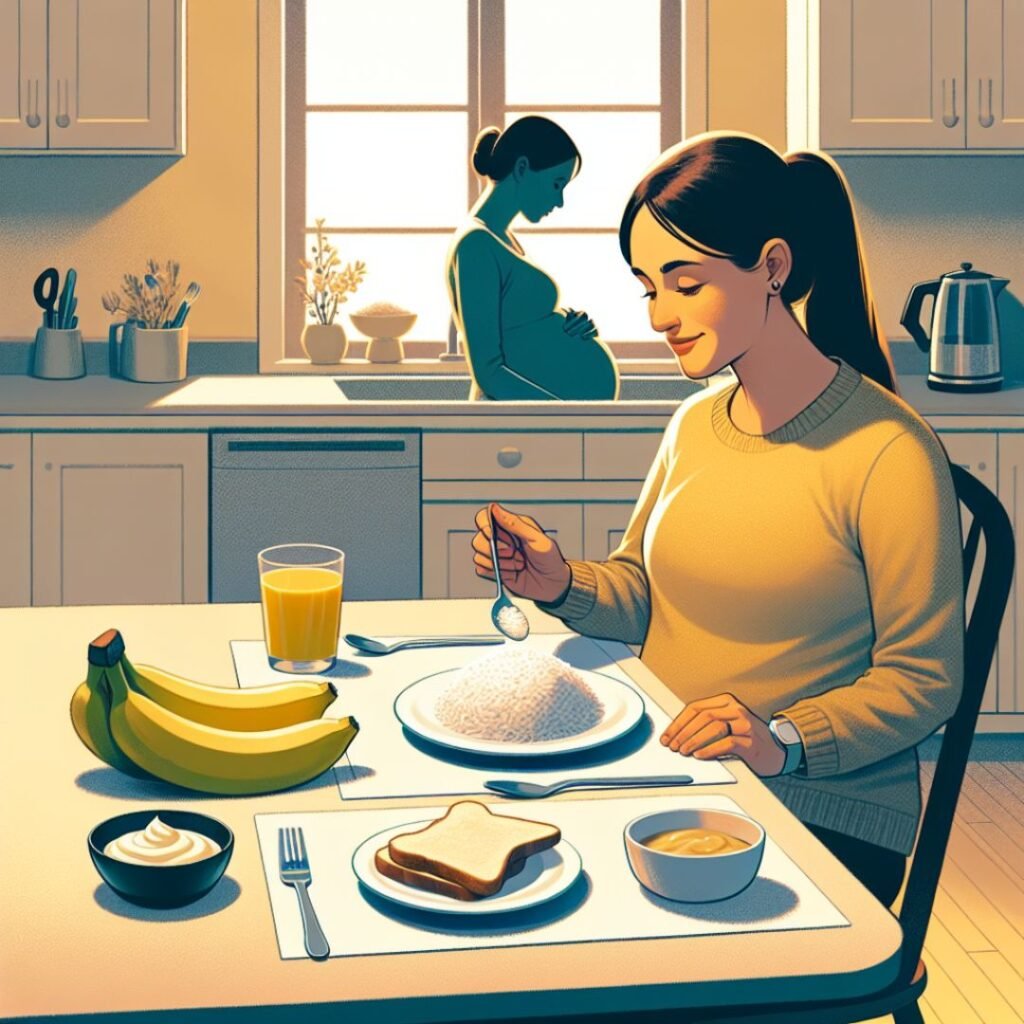Diarrhea, characterized by loose and frequent bowel movements, can be a particularly unpleasant symptom during early pregnancy. Hormonal changes, dietary adjustments, prenatal vitamins, and even fluctuations in stress levels can contribute to this digestive inconvenience.
While it’s not uncommon, it’s crucial to manage diarrhea effectively to maintain the health and well-being of both the expectant mother and her growing baby.
Importance of Management
Managing diarrhea is vital as prolonged or severe cases can lead to dehydration, nutrient deficiencies, and general weakness. For pregnant women, dehydration can be particularly dangerous, affecting both maternal health and fetal development.
Purpose of the Article
In this article, we’ll explore five simple and effective ways to handle diarrhea during early pregnancy. By following these guidelines, you can alleviate symptoms and safeguard your health.
1. Stay Hydrated

Drinking Fluids
- Importance of Hydration – Diarrhea can quickly lead to dehydration, an often-overlooked but severe condition during pregnancy. Staying hydrated helps replace lost fluids and maintain essential bodily functions.
- Types of Fluids to Consume– Water, Oral rehydration solutions (ORS), Clear broths (chicken or vegetable). Each of these options is gentle on the stomach and aids in restoring electrolytes.
- Fluids to Avoid– Caffeinated drinks like coffee and certain teas, Sugary drinks like sodas and fruit juices. These can irritate your digestive system and exacerbate symptoms.
Monitoring Urine Color
- Signs of Dehydration– Urine color can be a quick and easy indicator of your hydration status.
- What Is Normal– Healthy urine should be light yellow or straw-colored.
- When to Seek Help– If your urine remains dark yellow or amber despite drinking ample fluids, it’s time to consult a healthcare provider.
Eating Water-rich Foods
- Fruit and Vegetables– Incorporate hydrating foods like: Cucumbers, Watermelon, Strawberries. These foods help maintain fluid balance and provide essential vitamins and minerals.
- Benefits of Broths– Clear broths are nutrient-rich and hydrating, offering not only fluids but also minerals and some calories.
- Avoiding High-fiber Foods– While fiber is generally good, high-fiber foods can worsen diarrhea during this sensitive period. Aim for low-fiber options until symptoms improve.
2. Modify Your Diet

The BRAT Diet
- What It Is– The BRAT diet stands for: Bananas, Rice, Applesauce, Toast
- Why It Works– These bland foods help solidify stool and are easy on the digestive system.
- Gradual Introduction– Once symptoms improve, you can gradually reintroduce other foods into your diet.
Avoiding Dairy
- Common Triggers– Dairy products can aggravate diarrhea, especially in those with lactose intolerance.
- Lactose Intolerance in Pregnancy– Hormonal changes can temporarily affect how your body processes lactose.
- Safe Alternatives– Lactose-free products, Plant-based milk like almond or oat milk
Limiting Spicy and Fatty Foods
- Impact on Digestion– Spicy and greasy foods can irritate the digestive tract.
- Examples of Problem Foods– Chili peppers, Fried foods, Rich desserts
- Healthier Choices– Stick to bland and easy-to-digest options like plain rice, boiled potatoes, and steamed vegetables.
3. Practice Good Hygiene

Handwashing
- Importance– Proper handwashing minimizes the spread of infections that can cause or worsen diarrhea.
- Proper Technique– Use soap and water, Scrub for at least 20 seconds, Rinse thoroughly and dry with a clean towel
- When to Wash– Before eating, After using the bathroom, After handling raw foods
Food Safety
- Safe Cooking Practices– Thoroughly cook all meats and avoid raw or undercooked foods.
- Avoiding Contaminants– Keep food preparation areas clean to prevent cross-contamination.
- Storing Food Properly– Store foods at appropriate temperatures to prevent spoilage and bacterial growth.
Personal Cleanliness
- Daily Hygiene Routine– Regular bathing helps remove bacteria and keeps you feeling fresh.
- Clothing Hygiene– Change clothes frequently, especially if sweating or uncomfortable due to diarrhea.
- Using Safe Products– Avoid harsh chemicals and irritants in hygiene products to prevent skin irritation.
4. Use Safe Medication
Over-the-Counter Solutions
- Safe Medications– Certain medications like loperamide are generally considered safe during pregnancy but should only be used with medical advice.
- Doctor Recommendations– Always consult your healthcare provider before taking any medication.
- Reading Labels– Carefully read labels to understand dosages and potential side effects.

Probiotics
- Benefits– Probiotics can support gut health by maintaining a healthy balance of good bacteria.
- Types– Yogurt, Dietary supplements
- Consulting Healthcare Providers– Discuss with your doctor before beginning any new probiotic regimen.
Herbal Remedies
- Commonly Recommended Herbs– Some herbs like ginger or chamomile may help but always verify their safety during pregnancy.
- Potential Risks– Herbal remedies can interact with medications or have unintended side effects, making it crucial to consult a healthcare provider.
- Proper Usage– Ensure correct dosages and forms to avoid complications.
5. When to Seek Medical Help
Recognizing Severe Symptoms
- Warning Signs– Seek immediate help if you experience: Blood in stool, Severe abdominal pain, Persistent diarrhea lasting more than 48 hours
- Dangers of Severe Dehydration– Symptoms include extreme thirst, dizziness, and rapid heartbeat.
- When to Call a Doctor– If symptoms persist or worsen, it’s crucial to consult your healthcare provider promptly.
Possible Underlying Conditions
- Infections– Infections from bacteria or viruses may require specific treatments.
- Pregnancy-related Issues– Conditions like preeclampsia or gestational diabetes can present with diarrhea.
- Chronic Conditions– Awareness of conditions like IBS or Crohn’s disease is essential as they may require specialized care.
Hospital Treatment
- What to Expect– Potential interventions may include exams and lab tests to identify the cause.
- IV Fluids– Severe dehydration may be treated with intravenous fluids.
- Follow-up Care– Ongoing care is crucial to ensure full recovery and identify any recurring issues.
Conclusion
We’ve covered the importance of staying hydrated, modifying your diet, practicing good hygiene, using safe medications, and recognizing when to seek medical help.
Importance of Monitoring– Continuously monitor your symptoms and consult a healthcare provider if conditions persist or worsen.
Encouragement for Self-care– Taking care of yourself during this time is crucial for both your well-being and your baby’s development.
“Managing diarrhea effectively during early pregnancy can make a significant difference in your overall comfort and health. Remember, when in doubt, consult your healthcare provider.”
FAQs
Is diarrhea common in early pregnancy?
Yes, it can be due to hormonal changes, diet adjustments, and prenatal vitamins.
Can I take anti-diarrheal medications during pregnancy?
Always consult your healthcare provider before taking any medication during pregnancy.
What foods should I avoid if I have diarrhea while pregnant?
Avoid dairy, spicy, greasy, and high-fiber foods.
How can I tell if my diarrhea is caused by something serious?
Look for severe symptoms like blood in stool, severe pain, and persistent diarrhea. Consult your doctor if in doubt.
Should I change my prenatal vitamins if they cause diarrhea?
Speak with your healthcare provider to determine if a different prenatal vitamin would be better for you.
